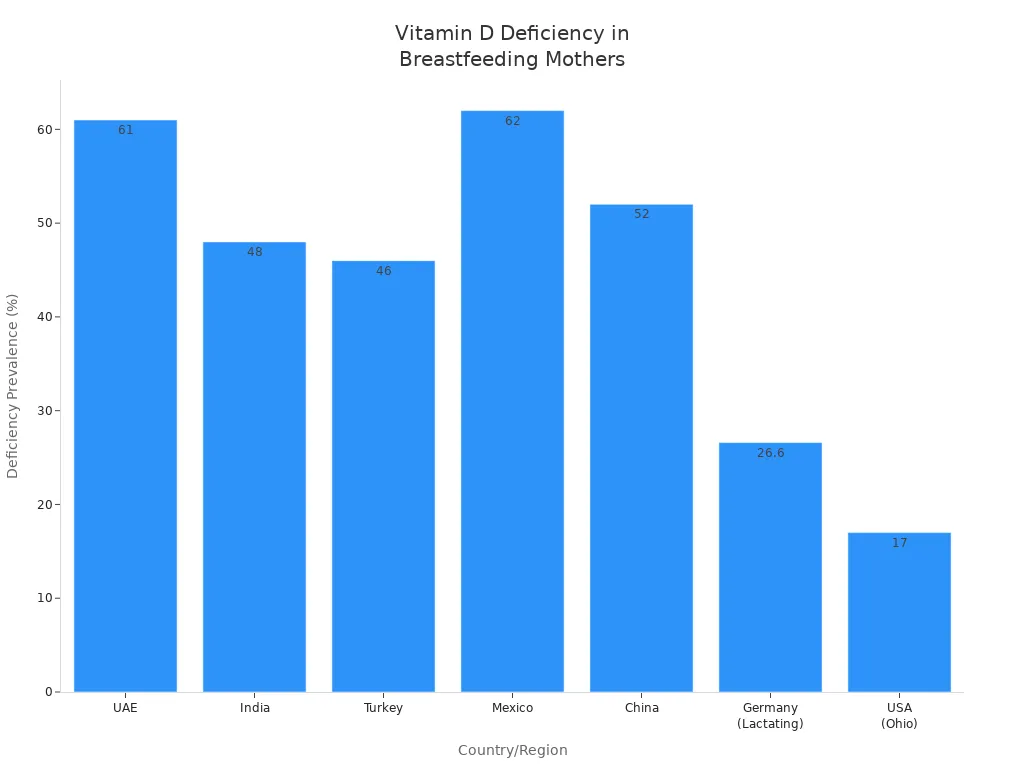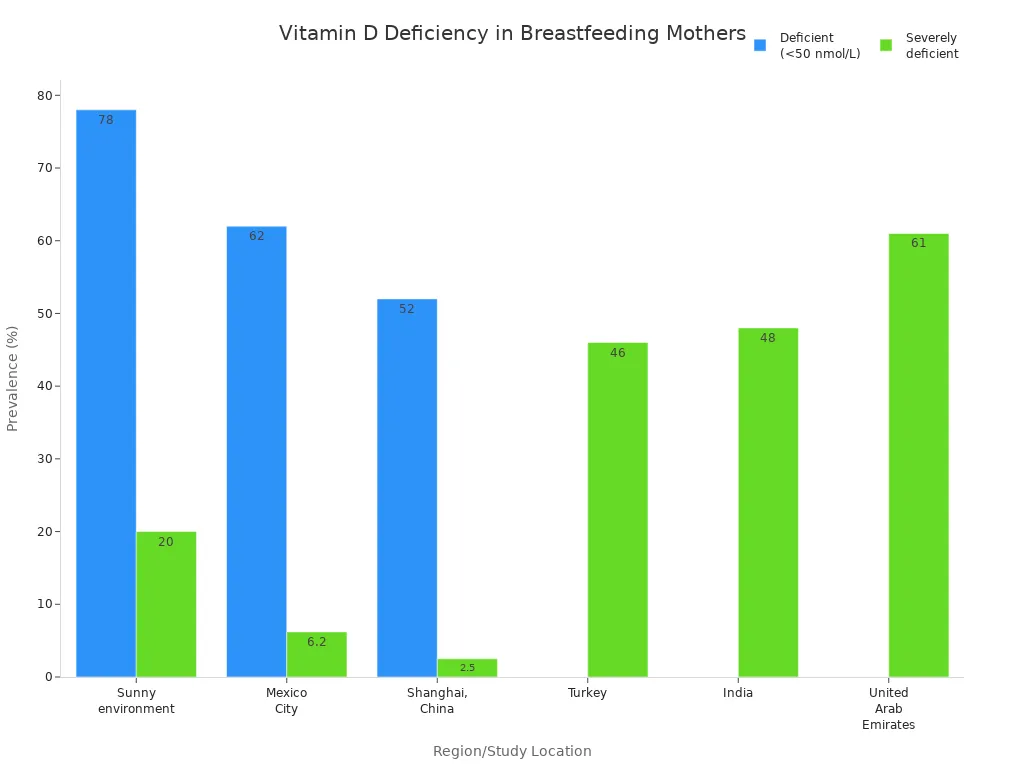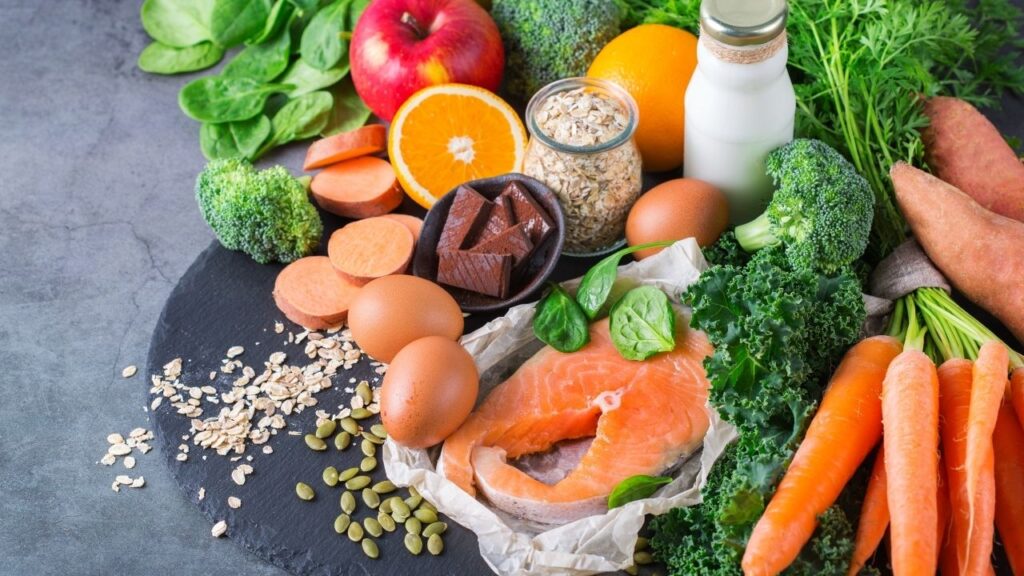You are doing a wonderful job as a breastfeeding mum. Consuming postnatal vitamin food rich for breastfeeding mums after birth supports both you and your baby.
The food you eat can influence the nutrients in your milk, which in turn helps your baby grow and strengthens their immune system.
Even small adjustments to your diet can make a significant difference. Many breastfeeding mums worldwide do not receive enough vitamin D, as illustrated below:
| Country/Region | Prevalence of Vitamin D Deficiency (<25 nmol/L) Among Breastfeeding Mothers |
|---|---|
| United Arab Emirates | 61% |
| India | 48% |
| Turkey | 46% |
| Mexico | 62% |
| China | 52% |
| Germany (Lactating) | 26.6% (deficient), 75.8% (insufficient <50 nmol/L) |
| Sweden (Winter) | 85% insufficient (<50 nmol/L), 15% in summer |
| USA (Ohio) | 17% deficiency (<50 nmol/L), high supplementation (87%) |
| Global (Chinese, American, Mexican populations) | 43% insufficient (<50 nmol/L) |

What you eat is crucial. By including a variety of postnatal vitamin food rich for breastfeeding mums in your diet, your milk remains nutritious, and you maintain good health.
Why Vitamins Matter
Benefits for Mum and Baby
You give your baby the best start in life when you focus on your nutrition. Vitamins play a huge role in your health and your baby’s growth.
When you eat a variety of postnatal vitamin food rich for breastfeeding mums, your breast milk becomes a powerful source of nutrients.
This helps your baby gain weight, build strong bones, and fight off infections. Your own body also benefits, as you feel more energetic and recover faster after birth.
Did you know? Breast milk changes over time to match your baby’s needs. It always contains a mix of vitamins, minerals, healthy fats, and proteins. This balance supports your baby’s brain, immune system, and overall development.
Here are some key reasons why vitamins matter during breastfeeding:
- Your breast milk provides all the vitamins your baby needs for the first six months.
- Some vitamins, like A, D, and B12, depend on what you eat.
- If you follow a vegetarian or vegan diet, you may need extra vitamin B12 to keep your baby healthy.
- Vitamin B12 deficiency in babies can cause serious problems, but early treatment works well.
- Vitamin D is vital for strong bones and helps prevent rickets.
A recent study found that mums who took higher doses of vitamin D had enough in their milk to meet their baby’s needs. This means you can help your baby get the right amount of vitamin D by looking after your own intake.
Common Deficiencies
Many breastfeeding mums do not get enough vitamin D. This is the most common deficiency, especially if you have limited sun exposure or darker skin.
Studies show that up to 93.8% of breastfeeding women may have low vitamin D levels without supplements. Other common deficiencies include vitamin B12, iron, and iodine. These shortages can affect both you and your baby.
You lose nutrients through breast milk, so your body needs more vitamins and minerals than usual. If your diet lacks certain nutrients, your milk may not have enough of them. Your body will always try to give your baby what they need, but this can leave you feeling tired or run down.
Tip: Eating a range of postnatal vitamin food rich for breastfeeding mums and considering supplements when needed can help you and your baby stay healthy.
Key Vitamins
Vitamin A
Vitamin A keeps your eyes healthy and helps your immune system work well. You need more vitamin A when breastfeeding—about 1300 mcg each day.
This is higher than during pregnancy. If you do not get enough, you might notice night blindness or feel more tired. Your baby also depends on your vitamin A for good vision and growth.
You can find vitamin A in two main forms. Animal foods like liver, eggs, and small fish give you preformed vitamin A, which your body uses easily.
Plant foods such as sweet potatoes, carrots, and red palm oil have provitamin A carotenoids. Your body turns these into vitamin A. Eating a mix of these foods helps you meet your needs.
Night blindness and poor growth in babies can happen if you do not get enough vitamin A. Try to eat a colourful diet with plenty of orange and green vegetables.
B Vitamins
B vitamins help your body turn food into energy. They also support your baby’s brain and nerve development. Vitamin B12 is especially important. If you do not get enough, your baby may have trouble growing or learning new things.
You can find B vitamins in many foods. Fish, eggs, nuts, beans, and dairy are all good choices. If you follow a vegetarian or vegan diet, you may need a supplement for vitamin B12.
| B Vitamin | Good Food Sources |
|---|---|
| B1 (Thiamine) | Fish, pork, seeds, nuts, beans |
| B2 (Riboflavin) | Cheese, almonds, red meat, oily fish, eggs |
| B6 | Chickpeas, nuts, fish, poultry, bananas |
| B12 | Shellfish, liver, yoghurt, nutritional yeast, eggs |
Vitamin C
Vitamin C helps your body heal and keeps your immune system strong. You need about 120 mg each day when breastfeeding. This is more than during pregnancy. Your baby cannot make vitamin C, so your milk is their only source.
Eat plenty of fresh fruits and vegetables. Oranges, kiwis, peppers, and tomatoes are great choices. These foods help you meet your higher needs and keep both you and your baby healthy.
Vitamin D
Vitamin D helps your baby build strong bones and teeth. Many breastfeeding mums do not get enough, especially if you spend little time in the sun.
Your body makes vitamin D from sunlight, but you can also get some from oily fish, eggs, and fortified foods. Still, most mums need a supplement.

Your breast milk is usually low in vitamin D. Taking a daily supplement and getting some sun helps you and your baby avoid deficiency.
Vitamin E
Vitamin E acts as an antioxidant. It protects your cells and supports your baby’s immune system. You need about 19 mg each day while breastfeeding. Nuts, seeds, vegetable oils, and green leafy vegetables are good sources. Try to include these in your meals and snacks.
Vitamin K
Vitamin K helps your blood clot and keeps your bones healthy. You need 90 mcg each day. Green leafy vegetables like spinach, broccoli, and lettuce are top sources. You can also get vitamin K from eggs, soybeans, and some fruits like strawberries.
Here is a table with the recommended daily intakes for key vitamins during breastfeeding:
| Nutrient | Recommended Daily Intake for Lactating Women (ages 19-50) |
|---|---|
| Vitamin A | 1300 mcg |
| Vitamin E | 19 mg |
| Vitamin D | 600 IU (15 mcg) |
| Vitamin K | 90 mcg |
| Vitamin C | 120 mg |
Eating a variety of postnatal vitamin food rich for breastfeeding mums helps you meet these needs and keeps you and your baby healthy.
Other Essential Nutrients
Iron
Iron keeps your energy up and helps your baby grow strong. You need 9 mg of iron each day while breastfeeding. If you eat less meat or follow a vegetarian diet, you might need to pay extra attention to your iron intake.
Good sources include lean meats, seafood, beans, lentils, spinach, and iron fortified cereals. Dried fruits like raisins and apricots also help.
Try eating vitamin C rich foods, such as oranges or tomatoes, with iron rich meals. This helps your body absorb more iron.
| Food Source | Iron Content (per serving) |
|---|---|
| Lean beef | 2.7 mg (85g) |
| Lentils (cooked, ½ cup) | 3.3 mg |
| Spinach (cooked, ½ cup) | 3.2 mg |
| Fortified cereal (1 cup) | 4.5 mg |
| Pumpkin seeds (28g) | 2.5 mg |
Tip: Pairing beans or spinach with a glass of orange juice boosts iron absorption.
Calcium
Calcium supports your bones and your baby’s growing skeleton. Your body loses some bone density during breastfeeding, but this usually returns after you stop.
Dairy foods like milk, cheese, and yoghurt are great sources. If you avoid dairy, try fortified plant milks, tofu, almonds, or leafy greens.
Eating a variety of postnatal vitamin food rich for breastfeeding mums helps you get enough calcium without needing supplements in most cases.
Protein
Protein repairs tissues and keeps you feeling full. You need more protein now than before. Try to include protein in every meal.
Good choices are eggs, chicken, fish, beans, lentils, tofu, nuts, and seeds. If you follow a vegetarian or vegan diet, mix different plant proteins to get all the amino acids your body needs.
- Lentils: 12g per half cup
- Edamame: 18g per cup
- Tofu: 8g per 100g
- Chicken breast: 26g per 100g
- Almonds: 6g per ¼ cup
Healthy Fats
Healthy fats, especially omega 3s, help your baby’s brain develop. Oily fish like salmon, sardines, and mackerel are top choices.
If you do not eat fish, try walnuts, flaxseeds, or chia seeds. These plant foods give you ALA, a type of omega 3, but your body does not turn much of it into DHA.
You might want to talk to your doctor about an algae based DHA supplement if you do not eat fish.
Note: Swap sunflower or soybean oil for olive or rapeseed oil to get a better balance of healthy fats.
Iodine
Iodine is vital for your baby’s brain and thyroid. You need about 290 mcg each day. Your breast milk gives your baby all their iodine, so your intake matters.
Dairy, eggs, seafood, and iodised salt are good sources. If you follow a plant based diet, check if your salt is iodised or ask your doctor about a supplement.
Folate
Folate (vitamin B9) helps your body make new cells and supports your baby’s growth. It also prevents anaemia. Leafy greens, lentils, beans, broccoli, eggs, and fortified cereals are all rich in folate.
Try to eat these foods often, but avoid taking too much from supplements unless your doctor advises it.
| Food Source | Folate Content (mcg) |
|---|---|
| Spinach (1 cup) | 100 |
| Cooked lentils (½ cup) | 180 |
| Broccoli (1 cup) | 60 |
| Fortified cereal | 100 |
| Avocado (1 medium) | 80 |
Eating a wide range of postnatal vitamin food rich for breastfeeding mums gives you and your baby the best chance for good health.
Postnatal Vitamin Food Rich for Breastfeeding Mums
Eating lots of postnatal vitamin food rich for breastfeeding mums helps you feel strong. It also helps your baby grow well. You can add these foods to your meals and snacks every day.
Whole Grains
Whole grains give you energy that lasts. They help you feel full for longer. They have B vitamins, iron, magnesium, selenium, and fibre. These nutrients help your body heal after birth. They also support your milk supply.
Try these whole grains:
- Rolled oats: Put them in smoothies or make overnight oats with fruit and nuts.
- Brown rice: Use brown rice or quinoa instead of white rice.
- Rye bread: Make sandwiches or toast with rye bread.
- Quinoa and farro: Add them to salads or serve as a side.
- Whole wheat pasta: Pick this for a filling lunch or dinner.
Oats are special because they have lots of iron and fibre. Many mums say oats help make more milk. Eat porridge with berries and seeds for breakfast. You can also snack on oatcakes with hummus.
Tip: You can cook whole grains ahead of time. Keep extra brown rice or quinoa in the fridge for quick meals.
Oily Fish and Seafood
Oily fish are great for omega 3 fatty acids. These help your baby’s brain and eyes grow. Oily fish also give you vitamin D, protein, and minerals. Try to eat 2–3 servings of low mercury fish each week.
Here is a table to help you pick:
| Category | Fish/Seafood Types | Notes |
|---|---|---|
| Low mercury, high omega 3 fish | Mackerel, Atlantic salmon, canned salmon, sardines, herrings, silver warehou | 2–3 servings per week recommended |
| Other low mercury seafood | Prawns, squid, octopus, snapper, trout, whiting, anchovy, bream, mullet, garfish | Safe to eat regularly |
| Fish to limit or avoid | Shark, marlin, swordfish, orange roughy, catfish | High mercury; limit or avoid |
You can add salmon, sardines, and mackerel to salads, sandwiches, or pasta. If you do not eat fish, ask your doctor about an algae based omega
3 supplement.
Note: Stay away from high mercury fish like shark, swordfish, and marlin. These can be bad for your baby’s growth.
Eggs and Dairy
Eggs and dairy are easy and cheap ways to get protein, vitamins, and minerals. Eggs give you choline, vitamin B12, riboflavin, selenium, and iron. These nutrients help your baby’s brain and give you energy.
One egg gives you over half your choline for the day. Two eggs give you about a third of your protein and vitamin B12 needs. Dairy foods like milk, yoghurt, and cheese give you calcium, vitamin D, and B vitamins.
Try these ideas:
- Eat boiled eggs with whole grain toast for breakfast.
- Have Greek yoghurt with fruit and nuts as a snack.
- Put cheese and tomato on rye bread for lunch.
If you do not eat dairy, pick plant milks and yoghurts with added calcium and vitamin D.
Snack idea: Mix chopped boiled eggs with avocado and spread on whole grain crackers.
Leafy Greens and Vegetables
Leafy greens are some of the best postnatal vitamin food rich for breastfeeding mums. They have pro vitamin A carotenoids, vitamin C, vitamin K, iron, and folate. These nutrients help your immune system and your baby’s eyes. They also keep your bones strong.
Good choices are:
- Kale, spinach, Swiss chard, and collard greens.
- Lettuce, arugula, and okra.
- Carrots, yams, and beets for more beta carotene.
- Green papaya and tomatoes for vitamin C and A.
Add spinach to omelettes, blend kale into smoothies, or put Swiss chard in soups. Roasted carrots and beets make a bright side dish.
Tip: Eat iron rich greens like spinach with vitamin C foods, such as tomatoes or oranges. This helps your body take in more iron.
Legumes, Beans, Nuts, Seeds
Legumes, beans, nuts, and seeds are full of protein, fibre, vitamins, and minerals. They are very important if you do not eat meat.
Here is what you get from these foods:
- Lentils, black beans, and chickpeas: High in protein, iron, vitamin K, and calcium. Chickpeas may help make more milk.
- Almonds and walnuts: Full of protein, healthy fats, iron, and B vitamins. Almonds are used in Ayurveda to help with milk.
- Chia, hemp, and flaxseeds: Rich in omega 3 fatty acids, calcium, and protein.
- Sesame seeds: Full of calcium and copper. Use crushed or hulled seeds for better absorption.
- Pumpkin and sunflower seeds: Give you iron, zinc, and healthy fats.
Snack ideas:
- Trail mix with nuts and seeds.
- Hummus with whole grain bread or veggie sticks.
- Lentil soup or bean salad for lunch.
Note: Eating beans or lentils with vitamin C foods, like peppers or citrus fruits, helps your body use the iron better.
Traditional Foods
Many cultures have special foods for new mums. These foods help you get stronger, make more milk, and heal after birth.
Some traditional foods are:
- Black seed (Nigella sativa) and fenugreek dishes, used in Muslim, Egyptian, and Pakistani cultures to help with milk.
- Dates, which give you quick energy and may help with milk let down.
- Warm soups with vegetables, fish, and bones, common in Chinese and Asian cultures.
- Panjiri, a wheat pudding with nuts and seeds from India, believed to help with milk.
- Pepper leaf soup with spices, used in Nigeria for healing after birth.
| Culture/Region | Recommended Foods | Foods Avoided | Purpose/Beliefs |
|---|---|---|---|
| Various migrant women | Butter, milk, apples, sweets, nuts, hot tea with cinnamon and ginger, protein rich foods, soups | Starchy foods, spicy foods, junk food, fatty food, alcohol, coffee | To replenish energy, cleanse blood, increase milk production |
| Chinese culture | Milk products, fruits, vegetables, meat, eggs, tofu, soup, congee, bird saliva, white fungus, fish, nuts, black sesame | Deep fried foods, junk foods, caffeine, raw meat/fish, certain fruits, spicy foods | Promote baby’s skin quality, brain development, and lactation |
| Other Asian cultures | Soup with vegetables, fish, meat, bones, daylily flowers, ginger | Salty foods, seafood (crab), certain fruits, herbal tea | Restore energy, aid uterine recovery, balance body humours |
You can try these traditional foods or change them to fit your taste. Many use foods you already have, like oats, lentils, leafy greens, and nuts.
Remember: Eating many kinds of postnatal vitamin food rich for breastfeeding mums, both vegetarian and non vegetarian, helps you and your baby stay healthy and strong.
Meal Ideas and Tips
Breakfast Ideas
Start your day with a breakfast that gives you lasting energy. Porridge made with rolled oats, topped with berries and a sprinkle of seeds, is quick and filling.
You can also try wholemeal toast with mashed avocado and a boiled egg. Greek yoghurt with chopped fruit and a handful of nuts makes a great grab and go option.
If you like smoothies, blend spinach, banana, and milk for a vitamin boost. These choices pack in B vitamins, calcium, and protein, all important for you and your baby.
Lunch and Dinner
Lunch and dinner do not have to be complicated. A vegetable and lentil soup is easy to make in advance and keeps well. Add a slice of wholegrain bread for extra fibre. G
rilled salmon or mackerel with brown rice and steamed broccoli gives you omega 3s, vitamin D, and iron. Stir fries with tofu, colourful vegetables, and quinoa are quick and full of nutrients.
You can batch cook meals like chilli with beans or chicken and vegetable tray bakes. Keep leftovers for the next day to save time.
Snacks
Snacks help you stay energised, especially when you are busy or tired. Keep a bowl of fresh fruit on the table. Snack on trail mix with nuts and seeds, or have hummus with carrot sticks.
Yoghurt with a spoonful of chia seeds is easy and rich in calcium. Wholegrain crackers with cheese or nut butter are handy for a quick bite. These snacks give you a steady supply of vitamins and minerals between meals.
General Advice
Hydration
You need to drink enough water each day. Breastfeeding can make you feel thirsty. Your body uses extra fluids to make milk. Try to keep a water bottle nearby.
Sip water during feeds or whenever you feel thirsty. Most mums need about 8–10 glasses of fluids daily. You can also drink milk, herbal teas, or diluted fruit juice. If your urine looks pale yellow, you are likely well hydrated. Dark urine means you may need more fluids.
Tip: Add a slice of lemon or a few berries to your water for a refreshing twist.
Caffeine and Alcohol
You might wonder if you can still enjoy your morning tea or coffee. You can have some caffeine, but keep it moderate.
Aim for no more than 200–300 mg of caffeine a day. That is about two mugs of coffee or three cups of tea. Too much caffeine can make your baby fussy or affect their sleep.
Alcohol passes into your breast milk. If you want a drink, wait until after you feed your baby. This gives your body time to clear the alcohol before the next feed. Try to limit alcohol to an occasional small drink. If you feel tipsy, wait before breastfeeding.
| Drink | Approximate Caffeine (mg) |
|---|---|
| Brewed coffee | 95 |
| Black tea | 47 |
| Green tea | 28 |
| Cola (330ml) | 32 |
Supplementation
Sometimes, food alone does not give you all the nutrients you need. You may need a supplement for vitamin D, B12, or iron. Your doctor or midwife can help you choose the right one. Always check before starting a new supplement. Some vitamins, like vitamin A, can be harmful in high doses.
Note: Supplements support your diet, but they do not replace healthy meals. Try to eat a variety of foods every day for the best results.
You can make your meals more vitamin
rich with just a few simple swaps. Try to:
- Add leafy greens or beans to your lunch.
- Snack on nuts, seeds, or yoghurt.
- Choose whole grains over white bread or rice.
Remember, small steps each day help you and your baby stay healthy. If you have questions, ask your doctor or midwife for advice. You are doing an amazing job—keep going, mum!
FAQ
What are the best snacks for breastfeeding mums?
You can grab yoghurt with fruit, a handful of nuts, or wholegrain crackers with cheese. Hummus with veggie sticks works well too. These snacks give you energy and important vitamins.
Can I get enough vitamins from food alone?
Most mums can get enough vitamins from a varied diet. Sometimes, you may need a supplement for vitamin D or B12. Always check with your doctor if you are unsure.
How much water should I drink while breastfeeding?
Aim for 8–10 glasses of fluids each day. Water is best, but milk and herbal teas count too. Keep a bottle nearby and sip often.
Do I need to avoid any foods when breastfeeding?
You do not need to avoid most foods. Some babies react to cow’s milk or spicy foods. If you notice a problem, talk to your doctor.
Are vegetarian diets safe for breastfeeding mums?
Yes, you can breastfeed on a vegetarian diet. Make sure you eat enough protein, iron, and vitamin B12. You might need a supplement for B12.



